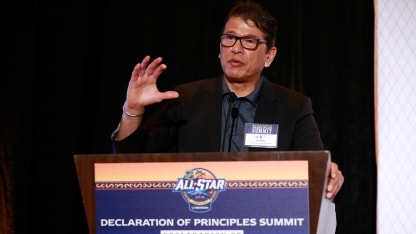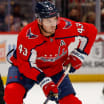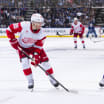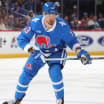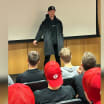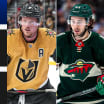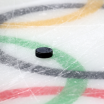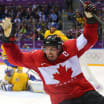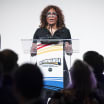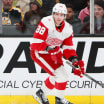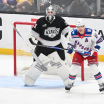I've been very proud of who I am since the day I was born. You don't need a month to celebrate who you are, but it's nice to have the recognition to let everyone know that everyone plays hockey, everyone loves the game. It's not just John Smith from downtown Toronto who plays. People play from remote areas, communities that are remote, First Nation people, black people, Asian people, everybody plays.
My heritage defines who I am. I grew up in a small First Nations community outside Sault Ste. Maire called Garden River, from a family of 12 -- 6 brothers and 5 sisters. We didn't have too much. The house that we had early on had no electricity, no indoor plumbing. I never had a shower inside a house until I was 16 years old when I went away to Kenora, Ontario. I remember waking up many a night freezing cold because the wood stove went out because somebody forgot, as the old saying goes, to put another log on the fire.
But what we lacked in amenities my parents made up for with love, caring and good family values that I carry to this day.
My family couldn't have afforded to put me through hockey in today's world. We made do with what we had. I wore size 6 hand-me-down skates on my size 3 feet. I used to wear rubber rain boots and wool socks to take up the empty space in the skates.
I joined the local recreation league -- played one game a week, one practice a week.
The turning point in my life came when someone who saw me play recreational hockey somehow arranged for me to get invited to try out for the Sault Ste. Marie Greyhounds. I didn't make the team, but they sent me to Kenora, Ontario, which was part of the Manitoba Junior Hockey League at the time.
It was the first time I ever went away from home. When I got to Kenora, I had a rude awakening on what racism was all about, the prejudice, the name-calling.
To this day, I don't remember too much of that season, I think I was traumatized, probably. But I managed to play through the whole season despite the racial taunts and win rookie of the year on the team.
The next year, I came home and played for the Soo Greyhounds and got drafted by the Detroit Red Wings in 1978. So what was probably one of the worst years of my life ended up being one of the defining moments in my life.
But Red Wings training camp was tough. The other guys were too big, too strong, too fast, their legs were massive. I had these skinny little legs, my arms weren't too much bigger. I didn't know what working out was.
I went to the rink the next morning, grabbed my skates and I hopped on a bus and came home. When I got home, my mom said, "A guy keeps calling you, his name is Ted Lindsay. I don't know who he is. He said you left camp and he wants to know where you are and he wants you to call him."
I called him back and, thankfully, I did. Ted explained things to me, which no one ever did for me in my life. He said, "That's what we're here for, we're here for development. We'll teach you how to get stronger, we'll teach you how to skate better."
I played in my first NHL game when I was 23 years old. I remember walking up those stairs in the old Chicago Stadium with tears of joy in my eyes. Right then and there I told myself, "I'm going to take this to as many First Nations communities as I possibly can and talk to our kids about, jeez, if I can do this you can do anything in your life."
Ever since that day I walked up those stairs in Chicago, I've been going to community after community delivering a message of inspiration to the next generation that they can achieve anything that they choose.
